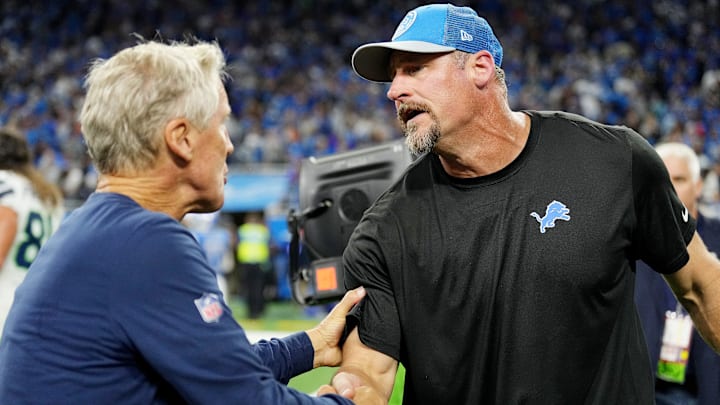In two plus-seasons as Detroit Lions head coach, Dan Campbell has been aggressive, almost to a fault sometimes. Going for it unabashedly on fourth down and giving the green light to fake punts is one thing when there is little or nothing at stake. But when it proves pivotal in a close loss like Sunday's to the Seattle Seahawks, early in a season with high expectations, the spotlight is put on anything that doesn't work.
Late in regulation on Sunday, the Lions were inside the 30-yard line with over a minute left and in theory multiple plays to take a shot at winning the game with a touchdown. But they let the clock go all the way down to 32 seconds. Then came a short completion, and a timeout (their first of the half) with 26 seconds left. One play run in over 30 seconds of time, with all three timeouts in your pocket.
We've seen this kind of late-game clock management from Campbell before, where he loses his aggressiveness and costs the Lions a potential win. It's a shift from his usual mode, at an inopportune time. Almost as if those critical moments are too big for him, but to be fair plenty of coaches blow clock management and it's easy to be critical from the 10,000-foot view.
Dan Campbell offers flimsy explanation for going conservative late vs. Seahawks
To Campbell's credit, he does not avoid tough questions or give non-answers to natural questions about why he did or didn't do something.
Via MLive, and SI.com, here's how Campbell explained going conservative late in the fourth quarter of Sunday's game.
"I never felt like we were crunched against the clock to score a touchdown,” Campbell said. “We didn’t feel that offensively because we still had time, we had timeouts, and it wasn’t that we just -- we weren’t able to convert. It was really more that. I felt like the time was -- we were good. We were good.”
"I wanted to take it as it came. Here's what I knew: They had two timeouts, and I did not want to give them the ball back. That was No. 1, do not give this ball back. No. 2, can we get down there far enough to score a touchdown. I already had it in my mind, if we get it to a certain point on fourth down, we will go for it. If not, we won't. Kicked the field goal. I felt like our chances were really good in overtime. It didn't work out."
Riley Patterson made a 38-yard field goal to tie the game at 31 as the fourth quarter expired. There's certainly a case for not wanting to give the Seahawks the ball back, with how bad the Lions' defense played. That was proven out when they got the first possession of overtime, scored a touchdown and the Lions' offense never got to touch the ball in the extra session.
But to let over 30 seconds of time go late in regulation with no plays run, and then call a timeout after the next play was a lame bit of clock management.
There are a lot of reasons the Lions lost on Sunday, and Campbell's late-game clock management is not necessarily high on the list. But in contrast to how aggressive he typically is, it's a concern that there was some resignation to play for overtime and a literal coin flip the Lions would ever have the ball again.
